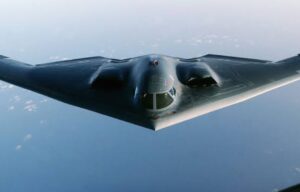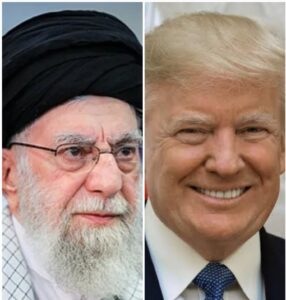U.S. Weighs Involvement in Israel-Iran Conflict Amid Escalating Tensions and Cryptic Trump Remarks
Samba Times Special

June 19, 2025 – Washington, D.C.s
As the Israel-Iran conflict intensifies, entering its seventh day of relentless airstrikes and missile exchanges, speculation is mounting over whether the United States will join Israel in military action against Iran. President Donald Trump’s ambiguous statement that “something big is gonna happen” has fueled uncertainty, while Iran’s Supreme Leader Ayatollah Ali Khamenei’s defiant response that “he is not afraid of anyone” underlines the high stakes of the escalating crisis. With global oil markets on edge and domestic political divisions in the U.S. sharpening, the possibility of American intervention looms large, raising fears of a broader regional war.
Trump’s Cryptic Warning and Iran’s Defiance
Speaking to reporters on Wednesday, President Trump hinted at significant developments, stating, “Something big is gonna happen,” without elaborating. The remark, coupled with his early departure from the G7 summit in Canada to address “what’s going on in the Middle East,” has sparked widespread speculation about U.S. intentions. On Truth Social, Trump further escalated his rhetoric, claiming the U.S. has “complete and total control of the skies over Iran” and warning that Iran’s leadership faces dire consequences if it targets American assets.
In response, Ayatollah Khamenei delivered a televised address, rejecting Trump’s call for “unconditional surrender” and asserting, “Intelligent people who know Iran will never speak to this nation in the language of threats, because the Iranian nation cannot be surrendered.” Iran’s Foreign Ministry echoed this defiance, warning that U.S. intervention would risk “all-out war” with “irreparable damage.” These statements highlight Iran’s resolve to resist external pressure, even as Israeli strikes target its nuclear facilities and military infrastructure.
The Israel-Iran Conflict: A Rapid Escalation
The current conflict erupted on June 13, 2025, when Israel launched a large-scale bombing campaign against Iran, alleging that Tehran’s nuclear program had crossed a critical threshold. Israeli airstrikes have since targeted centrifuge production sites, missile facilities, and key military leaders, including Iran’s wartime chief of staff, Ali Shadmani. Iran has retaliated with nearly 400 ballistic missiles and hundreds of drones aimed at Israel, killing at least 24 civilians, while Israeli strikes have claimed 224 lives in Iran, mostly civilians.
Israeli Prime Minister Benjamin Netanyahu has intensified pressure on the U.S. to join the offensive, particularly to target Iran’s deeply buried Fordow nuclear facility, which requires U.S.-made 30,000-pound bunker-buster bombs. Despite Trump’s public ambiguity, sources indicate he is growing “increasingly warm” to the idea of direct U.S. military action, a shift from his earlier focus on diplomacy.
Possibilities of U.S. Involvement
Several scenarios could draw the U.S. into the conflict:
- Direct Military Support for Israel: Trump could authorize U.S. airstrikes on Iran’s nuclear sites, leveraging American B-2 stealth bombers to target facilities like Fordow. The Pentagon has already deployed additional warships, including the USS Nimitz, and moved F-16, F-22, and F-35 fighter jets to the region, signaling preparations for a potential offensive role. However, such action risks triggering Iranian retaliation against U.S. bases, which Iran has threatened if Washington intervenes.
- Defensive Escalation: The U.S. has so far limited its role to defensive actions, helping Israel intercept Iranian missiles and drones. An attack on U.S. troops or assets by Iran or its proxies could force Trump to respond with offensive strikes to maintain credibility, a scenario he has warned would lead to “gloves off” retaliation.
- Diplomatic Collapse: Trump’s administration has pursued nuclear talks with Iran, but these were canceled after Israel’s initial strikes. With Trump now expressing frustration with diplomacy, stating he is “not too much in the mood to negotiate,” a failure to resume talks could push the U.S. toward military action as a means to curb Iran’s nuclear ambitions.
- Political Pressure and Domestic Divisions: Trump faces a divided Republican base. Hawks like Senator Lindsey Graham urge him to “go all-in” to dismantle Iran’s nuclear program, while isolationists like Representative Marjorie Taylor Greene and commentator Tucker Carlson warn that intervention contradicts Trump’s “America First” agenda. A decision to join the war could fracture his political coalition, especially if it leads to prolonged conflict or economic fallout, with oil prices already up 5% amid fears of supply disruptions.
Global and Regional Implications
U.S. involvement could transform the Israel-Iran conflict into a regional conflagration, drawing in Iran’s allies like Hezbollah, the Houthis, and militias in Iraq, while straining relations with U.S. partners like Saudi Arabia, which has condemned Israel’s strikes. The UN Security Council is set to hold an emergency session on Friday, with Iran, Russia, and China pushing for condemnation of Israel’s actions. Meanwhile, European leaders like French President Emmanuel Macron advocate for diplomacy, warning that military escalation threatens global stability.
Congressional Pushback
Fearing another “endless war,” Democratic Senator Tim Kaine and independent Senator Bernie Sanders have introduced resolutions to curb Trump’s war powers, requiring congressional approval for offensive action against Iran. These measures reflect bipartisan concerns, with some Republicans like Senator Rand Paul urging Trump to avoid entanglement. However, a recent poll indicates that 79% of Trump voters support providing offensive weapons to Israel, complicating his decision-making.
The Road Ahead
As Trump convenes his national security team, the world awaits clarity on whether the U.S. will cross the threshold into direct conflict with Iran. His cryptic remarks and Iran’s unyielding stance suggest a volatile path forward, with the risk of miscalculation high. For now, the U.S. remains poised on the brink, balancing domestic pressures, strategic imperatives, and the specter of a war that could reshape the Middle East.





